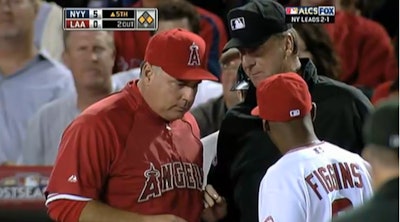They say the best compliment a baseball umpire can get is if neither team can name who called their game. So far in this Major League Baseball postseason, umpires are stealing headlines. "Does Baseball Need Umpires?" asked Jonah Kuri in his Oct. 14 Wall Street Journal column, days after Phil Cuzzi called foul a fly ball off the bat of Minnesota's Joe Mauer that actually fell a foot inside the leftfield line during Game 2 of the American League Division Series. Kuri couldn't have predicted the sorry spectacle that was Game 4 of the American League Championship Series six days later. In the span of 11 batters, umpires Dale Scott and Tim McClelland botched three calls so badly that Sports Illustrated baseball writer Tom Verducci, who worked a 2007 spring training game as its first-base umpire, called for the creation of a review board - not to grade umps, but to examine everything from individual mechanics to crew dynamics.  TimMcClelland.png
TimMcClelland.png
There are others championing expanded use of instant replay, currently employed only to confirm the accuracy of home run calls, but MLB commissioner Bud Selig hasn't budged. Meanwhile, respondents to an MLB Fanhouse online poll favor replay expansion by a 6-to-1 ratio. As it stands, high-definition replays of ball-and-strike calls and tag plays from multiple angles serve only to vividly and repeatedly parade the embarrassments of human error before a television audience. No doubt, "Kill the ump!" (or something less quaint) was uttered in more than a few Minneapolis households as the Twins fell behind two games to the heavily favored Yankees, even though one can debate whether Cuzzi's miscue played a truly decisive role in New York's eventual series sweep. "Unless you umpire, you can't possibly understand," Cuzzi told the Newark (N.J.) Star-Ledger after Game 2. "It happens. It happens at the worst possible time. And it happened to me." I think I can understand, on some level, because I've umpired youth, high school and men's league baseball, and it happened to me, too. I recall working the plate for one particular late-summer men's game during which I, for reasons I can't explain, had a strike zone roughly half the width of a toothpick. I was squeezing the home team's ace pitcher in particular, but I was powerless to correct my own tunnel vision. It made for a long afternoon, and it would lead to my leaving the officiating fraternity for good after that 1988 season - my love of baseball greatly eroded for having experienced firsthand the on-field confrontations and bleacher catcalls. Attending a Milwaukee Brewers game wasn't even the same for a time, having as I did a better idea than most fans of the pressures those ideally anonymous men in blue were enduring. It took only one game in the crosshairs to give Verducci a renewed respect for umpires and the umpiring profession. "My loose definition of 'greatness' is making the difficult look easy," Verducci wrote in March 2007. "You may love to vent your frustrations at them, but umpires are great at what they do." To his credit, McClelland, like Cuzzi, owned up to his shortcomings, stating after Game 4, "I'm just out there trying to do my job, and I'm doing the best that I can." I hear you, brother.





































